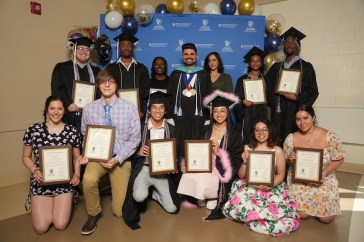
Jen Blessing ’14 has always loved animals.
But it was her work at UNH's Thompson School of Applied Science that led her to a career where she uses her love for dogs to make a difference in the lives of service members and veterans.
At UNH, Blessing explains, she studied applied animal science with a concentration in small animal care. “During my time in this program, I had invaluable hands-on experience that led me to finding my passion,” she says.
Every week, she recalls, she put the knowledge she was gaining in class into practice at a local animal shelter.
“My peers and I would assist in the mandatory medical examinations for the shelter animals and also trained shelter dogs in basic obedience in hopes of making them more adoptable,” she explains. “It was this experience that was the pivotal moment for me; I discovered that training dogs made every ounce of me fill with happiness.”
With that realization, Blessing began researching careers where she could work with dogs every day.
“The job that really earned my interest and ultimately won me over was working with service dogs,” she says. “With the help of my student advisor, we found opportunities that would get me in the field of working hands-on with service dogs.”

In December of 2015, she began her job at Warrior Canine Connection in Maryland.
“Warrior Canine Connection's mission is to positively reconnect Veterans and Service Members with aspects of their lives that physical or psychological impairments have impacted,” Blessing explains.
The unique organization includes two programs that help achieve its mission. “Founder Rick Yount piloted Mission-Based Trauma Recovery, which enlists the help of service members currently receiving treatment for visible or invisible injuries to participate in a form of nontraditional therapy,” Blessing says. “While participating in Mission-Based Trauma Recovery, the service members learn how to train a service dog, knowing that the dog is going to be placed with a veteran in the future. It is the service members’ way of giving back to their brothers and sisters in arms and is the ultimate motivator.”
The second part of Warrior Canine Connection’s mission is to provide highly trained service dogs to veterans with disabilities, and because the organization “enlists service members in this mission, one dog can impact more than 60 warriors in the short two years that the dog is in training,” Blessing adds.
So, what does a typical day — if there is such a thing — entail?
“Every day is different when working with live animals!” Blessing laughs, noting there is a general routine: “Every morning, the service dogs in training get dropped off by their puppy raisers — we refer to them as puppy "parents" — at one of our location sites to start the dogs' work day. The dogs have time to play with one another before and in between the service members' appointments with us.”
Each day usually averages about four appointments with service members, and in each session, Warrior Canine Connection staff and the service members work with a different dog on the commands or skills that particular dog needs to learn.
“Because our dogs will have public access, they need to be familiarized with things such as escalators, shopping malls and public transportation,” Blessing explains. “It is up to the service members to help the dog get comfortable with each of these things, which could be especially challenging if the service members are struggling with anxiety themselves.”

However, she adds, “This is where the mission drives the success of the program.” By taking the dog to places like shopping malls or on escalators or public transportation, “the service member can begin to create new, positive associations with these places. Warrior Canine Connection trainers assist and guide every session and help train the dogs in between the sessions with service members.”
At the close of each day, “the service dogs in training get picked up by their puppy parents and relax at their homes after a solid day of work,” Blessing says.
At the end of her day, Blessing knows this is work that makes a difference.
“The most rewarding thing about my work is not only being surrounded by wiggly golden and Labrador retrievers but seeing the difference these canines make in people's lives on a daily basis,” she says. “Service members will often show up to an appointment in pain, frustrated or with a negative mindset. As soon as we get them working with the dogs, we see their whole demeanor shift. The Marine that wouldn't crack a smile is now cheering with excitement and laughing as he instructs one of the dogs to tug open a door. The dogs evoke pride, happiness, patience, positivity and recovery.”
Learn more about the Thompson School's applied animal science program here.
-
Written By:
Jennifer Saunders | Communications and Public Affairs | jennifer.saunders@unh.edu | 603-862-3585



















































